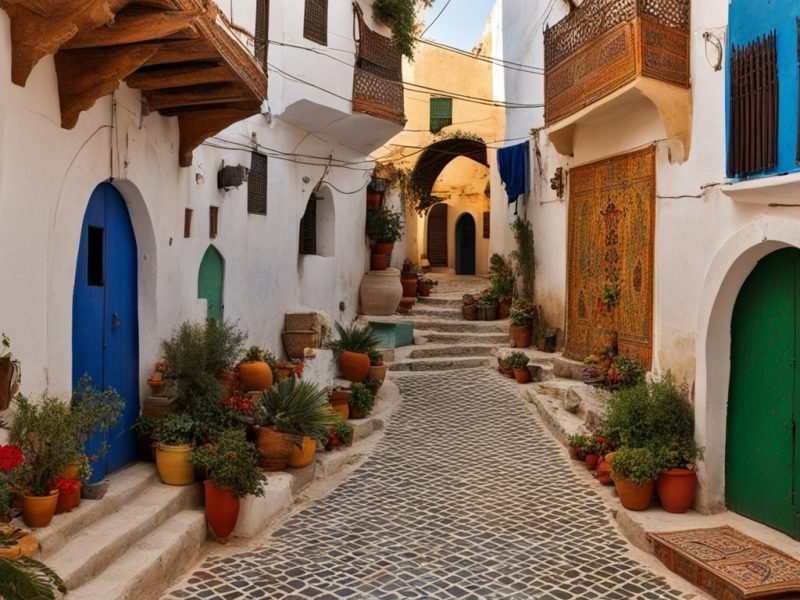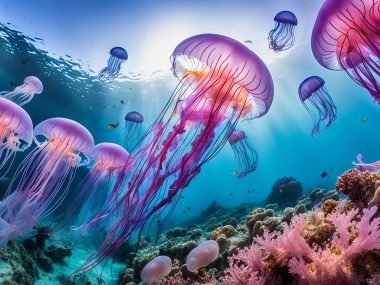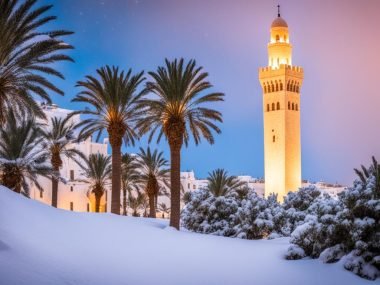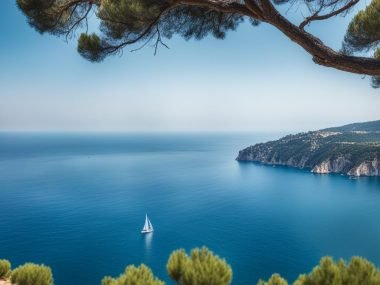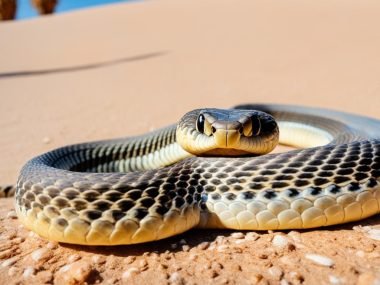Did you know that nearly 98% of Tunisia’s people say they are Arab? It is in the north of Africa. Tunisia has borders with Algeria, Libya, and the sea. Though Arabic is its main language, Tunisia’s past is complex. Many cultures have added to its story. So, is it just an Arab country?
Tunisia is like a big mix of different cultures. Its history has many layers. There were Phoenician, Roman, Arab, Ottoman, and French influences. These have shaped Tunisia’s culture and identity. So, while Arab traditions are important, there’s more to the story.
Key Takeaways
- Tunisia is located as the northernmost country in Africa, part of the Maghreb region.
- 98% of Tunisia’s population identifies as Arab, with Arabic being the official language.
- The country boasts a rich history influenced by multiple ancient and modern civilisations.
- Its strategic location along the Mediterranean has fostered a diverse cultural heritage.
- Tunisia’s identity is shaped by its Arab heritage combined with diverse historical influences.
Geographical Location of Tunisia
Tunisia is in the heart of North Africa. It has a special spot that makes it important. Its place near the Mediterranean sea is key for access and impact.
Tunisia’s Position in North Africa
Tunisia sits at 34°N 9°E. This spot in North Africa is crucial. It links to the Maghreb region, bringing cultures and trade together. This mix shapes its character.
Neighbouring Countries
Tunisia is next to Algeria and Libya. This spot is very strategic. It also faces Italy across the sea. This includes nearness to Sicily, Sardinia, and Malta. These factors highlight its central Mediterranean role.
Strategic Importance of Tunisia
The country’s place by the sea makes it really important. Tunisia connects trade, cultures, and politics in North Africa and the Mediterranean. Its land and sea closeness to important areas boost its role.
Tunisia’s strategic spot in the Mediterranean has always caught attention. Different civilisations and modern strategies show its lasting importance in area politics.
The Demographics of Tunisia
Tunisia is a country with a rich mix of people. Over eleven million people live here. They are mainly Arabs, Berbers, and a few Jews and others. Let’s look at Tunisia’s different people and beliefs.
Ethnic Composition
Most people in Tunisia are Arabs, making up 98% of everyone there. This shapes the country’s culture and way of life. Berbers make up about 1% of the population. They add a special part to Tunisia’s mix. There’s also 1% of Jews and other groups.
Religious Makeup
Sunni Islam is the main religion, followed by 99% of people. Yet, there’s a mix of other beliefs too. Christians, Jews, Shia Muslims, Bahá’ís, and those with no religion make up 1%. This shows how different faiths can come together in one place.
Population Statistics
In 2020, about 11,708,370 people lived in Tunisia. These numbers show how diverse and dynamic the country is. Different ethnic groups and religions make Tunisia what it is today.
| Ethnic Group | Percentage |
|---|---|
| Arabs | 98% |
| Berbers | 1% |
| Jews and Other Groups | 1% |
Historical Influences on Tunisia
Tunisia has a long and rich history shaped by many influences. Ancient Carthage and periods of Ottoman and French rule have all played their parts. Together, they have crafted the unique identity and culture of modern-day Tunisia.
Ancient Carthage
Carthage was a big deal in the 9th century BC. It was a leading power in the Mediterranean thanks to its strong navy and economy. Even though Rome defeated it in 146 BC, Carthage’s remains are crucial for understanding Tunisia’s past.
Arab Conquest and Islamisation
The 7th century changed Tunisia a lot with the Arab conquest. This time brought Islam, along with its culture, laws, and language. These influences are still a big part of Tunisia today, marking an important chapter in its story.
Ottoman and French Rule
The Ottoman Empire took over Tunisia in the 16th century. This time was stable and added much to Tunisia’s architecture and culture. But then came the French in the 19th century. They changed Tunisia’s economy and built new structures. They even made French an important language.
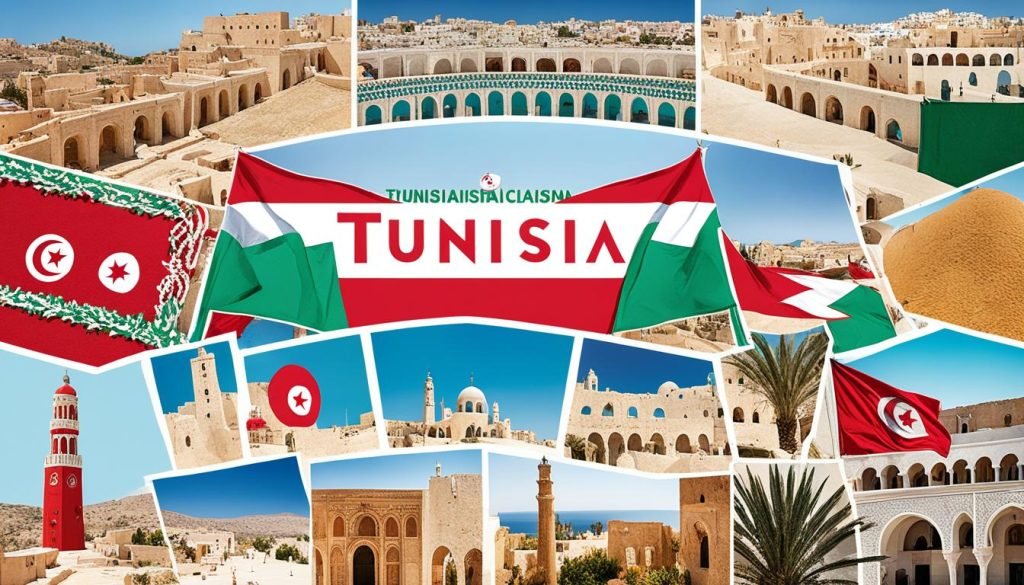
| Era | Key Influences |
|---|---|
| Ancient Carthage | Established 9th century BC, maritime prowess, economic reach, defeated by Roman Republic in 146 BC |
| Arab Conquest | Began in 7th century AD, widespread Islamisation, establishment of Islamic culture and law |
| Ottoman Empire | 16th century, stability, architectural and cultural contributions |
| French Colonialism | 19th century to 1956, economic restructuring, infrastructural development, introduction of French |
Tunisian Culture and Identity
Tunisia’s culture is like a colourful blanket. It is made from history, like old buildings and markets. The practices of Islam are common here. The country values its mixture of traditions and people.
Arabic is the main language, but French is also important for school and work. This shows how history has blended cultures together.
Cultural Practices
Traditional Tunisian culture is very interesting. You can find tasty food with inputs from the sea and mountains. You can also see beautiful things made by hand in the markets.
The country has special festivals like Eid and Mawlid. Art, music, and dance are very important. They mix old stories with new ideas.
Linguistic Heritage
Tunisia is special because people speak two languages. Arabic is the official one, but there is also Tunisian Arabic for everyday talk. French is used in business and schools.
This is because Tunisia has a long history with France. People use French in many parts of life.
Influence of Religion on Culture
Religion is very important in Tunisia. Islam influences how people live every day. From the design of buildings to the clothes for festivals, religion is everywhere.
It also guides the rules and learning in the country. Religion and culture in Tunisia are closely connected.
Language in Tunisia
Tunisia’s languages tell a story of its rich past and mix of cultures.
Official and Vernacular Languages
Modern Standard Arabic is the official language. It’s used in government, law, and formal writing. Yet, most Tunisians chat in Tunisian Arabic daily. This local dialect mixes many languages and has unique phrases.
It’s different from Modern Standard Arabic. It helps shape Tunisia’s unique cultural voice.
The Role of French
French is key in Tunisia, though it’s not official. It’s widely used in administration, education, and business. This comes from Tunisia’s history with France.
This use of French links Tunisia to the wider French-speaking world. It’s a big advantage.
French isn’t just a leftover from the past. It’s a big part of work and communication today. Along with Arabic, French gives Tunisia a special bilingual culture. This blends with the local and official Arabic forms.
| Language | Usage |
|---|---|
| Modern Standard Arabic | Official language used in governmental and legal contexts |
| Tunisian Arabic | Vernacular language used in daily communication |
| French | Language of administration, education, and business |
Is Tunisia An Arab Country?
Is Tunisia an Arab country? This question brings up many points. Most people there have Arab roots. Arabic is not just widely spoken; it’s the official language too.
Tunisia’s membership in the Arab League reinforces its standing as an Arab nation.
Tunisia and other Arab League countries share culture, politics, and economy. This bond shows they are all Arab.
Now, let’s compare Tunisia to other Arab League countries:
| Country | Primary Language | Arab Descent (%) | Membership in Arab League |
|---|---|---|---|
| Tunisia | Arabic | 98% | Yes |
| Saudi Arabia | Arabic | 90% | Yes |
| Morocco | Arabic | 99% | Yes |
Being part of such a key group shows Tunisia’s Arab roots. Plus, most people in Tunisia are of Arab descent. This makes Tunisia very much like other Arab League nations.
Tunisia’s Membership in the Arab League
Tunisia is an important member of the Arab League. It shows Tunisia’s strong ties with other Arab countries in business, culture, and politics. This membership proves Tunisia’s loyalty to the Arab world and its place in Arab politics.
Since 1958, Tunisia has been a part of the Arab League. It works on projects that bring countries together. These include trade deals, sharing in education, and new technology. Tunisia shows its dedication to being part of one Arab family through these actions.
Being in the Arab League helps Tunisia in talks that matter in the region. This role helps Tunisia at home and on the world stage. It makes the country stronger.
Through the Arab League, Tunisia talks on important issues like peace and development. By taking part, Tunisia shows it stands with Arab goals. It shows Tunisia’s promise to work with other Arab countries.
In short, being in the Arab League is key for Tunisia. It marks Tunisia’s political views and cultural ties. This link helps shape Tunisia’s path among Arab nations today.
The Impact of the Arab Spring on Tunisia
The Arab Spring started in Tunisia after Mohamed Bouazizi set himself on fire in December 2010. This sad event led to many protests across the country. It was the start of the Jasmine Revolution.
Events Leading to the Revolution
Anger made thousands of Tunisians protest in the streets. They were tired of the tough life and unfair rules under President Zine El Abidine Ben Ali. He had been in power for 23 years.
These protests made Ben Ali leave Tunisia in January 2011. It was a big change for the country’s future.
Political Reforms
The Tunisia Revolution led to big changes. A new constitution was made in 2014. It aimed to make the government fairer and protect people’s rights.
This constitution was praised for supporting women’s rights and freedom of speech. It was a big step forward.
Current Political Climate
Even with reforms, Tunisia’s political situation is still hard. It’s seen as a hope for democracy in the Arab world. Yet, it struggles with money problems and sometimes political troubles.
There’s worry about democracy going backwards. Recent events suggest power is getting too centralised. People wonder if the changes from the Arab Spring will last.
Modern Governance of Tunisia
Tunisia has changed a lot after the Arab Spring. It now has a government that works in a special way. It’s called a unitary semi-presidential republic.
This means the President and the Prime Minister are both very important. They help run the country together.
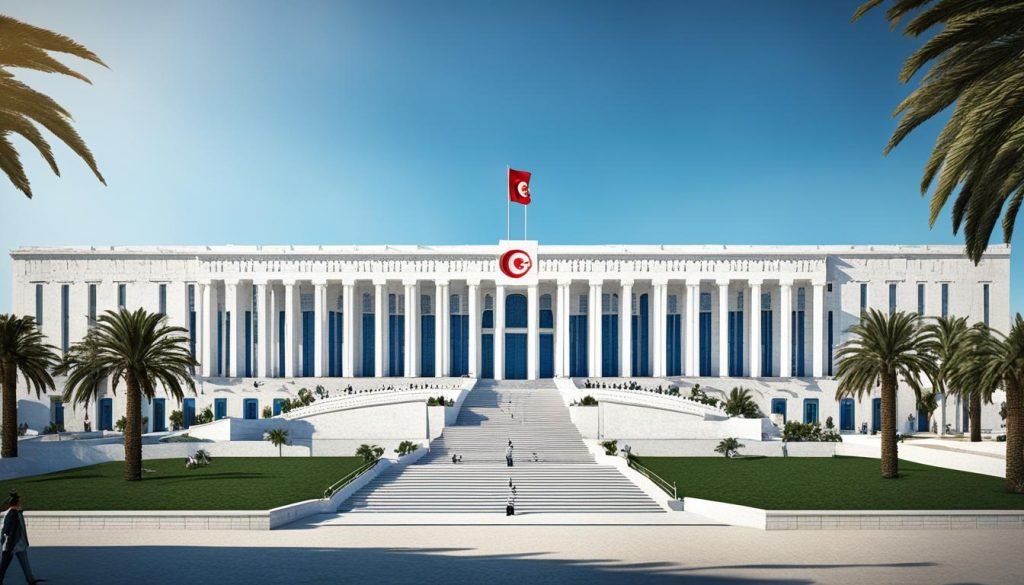
Political Structure
Tunisia’s government is split into different parts. The main parts are the executive and the legislative. The executive has the President and the Prime Minister.
The legislative has two groups. One is the National Council of Regions and Districts. The other is the Assembly of the Representatives of the People. These parts check on each other to keep things balanced.
Key Government Figures
President Kais Saied is a big figure in Tunisia. He has a lot of power, in and outside the country. Alongside him, Prime Minister Ahmed Hachani leads the executive branch.
They work together to make sure laws are followed. This helps Tunisia remain stable and grow better for its people.
The government in Tunisia is really trying to improve. It wants to make its democracy stronger and its politics work better for everyone.
Conclusion
Tunisia is truly an Arab nation, with its people, language, and Arab League ties. Arabic and Arab traditions show its deep roots in the Arab world. But, Tunisia’s story is also shaped by its diverse past. Its history includes times under Carthage, Ottoman, and French influence.
In exploring Tunisia, we find a place where Arab culture and other histories mingle. Its spot by the sea made it a meeting point of cultures. This has created a Tunisia that honors both Arab heritage and its varied past. It’s a place where different cultures live together.
To sum up, Tunisia is an example of Arab identity living with historical influences. Its culture and spot by the sea make it important in history. Looking ahead, this mix of Arab and Tunisian traits will keep shaping its story.

